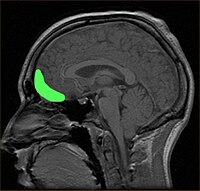
Photo from wikipedia
Ambivalence, the simultaneous experience of positivity and negativity, is a conflicting, uncomfortable, arousing state but is a necessary catalyst for behavior change. We sought to examine whether feelings of ambivalence… Click to show full abstract
Ambivalence, the simultaneous experience of positivity and negativity, is a conflicting, uncomfortable, arousing state but is a necessary catalyst for behavior change. We sought to examine whether feelings of ambivalence can be reduced using instructed emotion regulation of positive and negative affect, the components of subjective ambivalence. Event-related brain potentials (ERPs) were collected while participants played 3 blocks of mixed gambles, in which each trial involved losing or winning the lesser or greater of 2 amounts. In the 1st block participants responded naturally, and in the 2nd and 3rd blocks they were instructed to focus on either the positive or negative aspects of the outcome. Disappointing wins (e.g., winning $5 instead of winning $12) and relieving losses (losing $5 instead of losing $12) reliably elicited ambivalence; focusing on either the negative or positive aspects of the outcome reduced ambivalence as well as the magnitude of the late positive potential (LPP), indicating successful regulation. Both self-reported affect and ERPs indicated that emotional responses to losses were more difficult to regulate than responses to wins, consistent with a negativity bias in affective processing. Results are interpreted in the framework of theories of affect, and implications for changing behavioral motivation to support healthy behaviors are discussed. (PsycINFO Database Record (c) 2020 APA, all rights reserved).
Journal Title: Emotion
Year Published: 2020
Link to full text (if available)
Share on Social Media: Sign Up to like & get
recommendations!